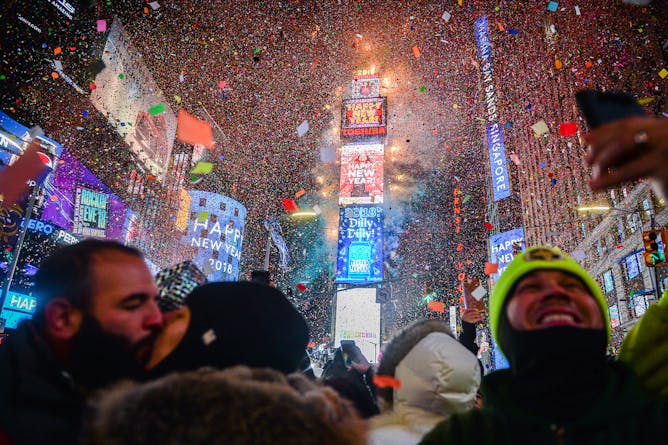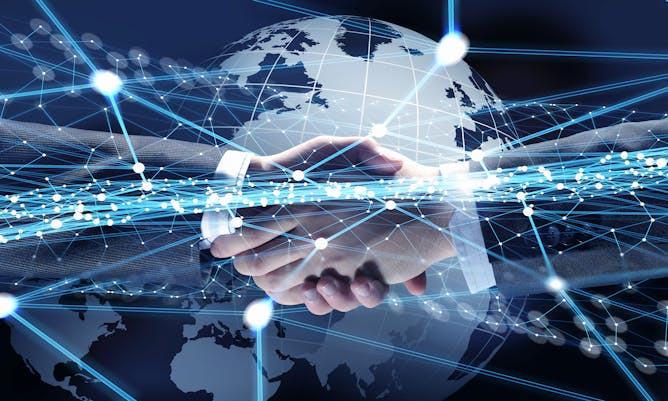| |
|
|
|
|
|
|
| |
|
Editor's note
|
|
Many Americans will see snow plows clear their roads today, but few will consider that the salt those plows often drop is a pollutant – with effects scientists are still trying to understand. Many of our body’s natural processes are influenced by Circadian rhythms – from sleeping and eating to fighting off infections. Environmental changes, such as traveling by plane across time zones, can scramble these rhythms – and so can exposure to environmental toxins like road salt, as biologist Jennifer Hurley recently found. Although Hurley’s
research focused on the effects of salt on zooplankton, her findings suggest that pollution may have broader effects on larger organisms, including human beings.
Americans are beginning 2018 more hopeful about the economy than they’ve felt in at least a decade. So what issues and themes could stoke or spoil that sense of optimism? We asked four economists to offer their insights.
And as as people are increasingly dependent on digital technology they are also feeling a growing distrust about its power in their personal lives and society at large. Tufts University’s Bhaskar Chakravorti, a scholar of digital trust, discusses how these conflicting forces might play out through the coming year.
|
Jennifer Weeks
Environment + Energy Editor
|

|
|
Top stories
|

Salting streets in Milwaukee.
Michael Pereckas
Jennifer Marie Hurley, Rensselaer Polytechnic Institute
A recent study shows plankton that have adapted to road salt have disrupted circadian rhythms. This finding suggests that environmental pollutants could also affect human circadian clocks.
|

At least one economist worries we’ll be mostly poorer.
AP Photo/Go Nakamura
Greg Wright, University of California, Merced; Christos Makridis, Stanford University; Patricia Smith, University of Michigan; William Hauk, University of South Carolina
We asked four of our regular economics writers to examine a key theme they expect to flare up in 2018 and why.
|

Trust in online systems varies around the world.
Sergey Nivens/Shutterstock.com
Bhaskar Chakravorti, Tufts University
Around the world, people are both increasingly dependent on, and distrustful of, digital technology. New research suggests ways this conflict could unfold.
|
Politics + Society
|
-
Miranda Lynne Baumann, Georgia State University; Brent Teasdale, Illinois State University
After mass shootings, calls go out to keep guns out of the hands of the mentally ill. But data show this solution is misguided.
-
Ingo Trauschweizer, Ohio University
The National Security Strategy does a good job at listing problems and suggesting fixes. But there’s more to strategy than that.
|
|
Health + Medicine
|
-
Deborah Linder, Tufts University
More than half of dogs and cats around the globe are overweight. Are well-intentioned owners to blame?
-
Jennifer Kraschnewski, Pennsylvania State University
We turn to doctors to treat cancer, addiction and high blood pressure. And, they have a lot of training and tools to help us. Why is that not so with obesity?
|
|
Science + Technology
|
-
Bill Syrett, Pennsylvania State University
It's really hard to get measure snowfall accurately. The National Weather Service relies on more than 8000 volunteers with rulers.
-
Jack Goodman, University of Toronto
Snow shoveling during or after a blizzard may be the "perfect storm" for a cardiac event. Doing warm-up exercises beforehand can make it safer.
|
|
Trending on site
|
-
Traci Mann, University of Minnesota; A. Janet Tomiyama, University of California, Los Angeles
Dieting is a setup. The act of dieting causes physiological changes that make it hard to continue dieting successfully. Here's how the body fights back when some people try to lose weight.
-
Jeremy David Engels, Pennsylvania State University
Why you might be getting gratitude all wrong.
-
Melissa Wdowik, Colorado State University
For centuries, people have been trying to lose weight in all sorts of ways – including drinking vinegar, avoiding swamps and stocking up on grapefruit.
|
|
|
|
| |
| |
|
|
|
|
|
|
|
|